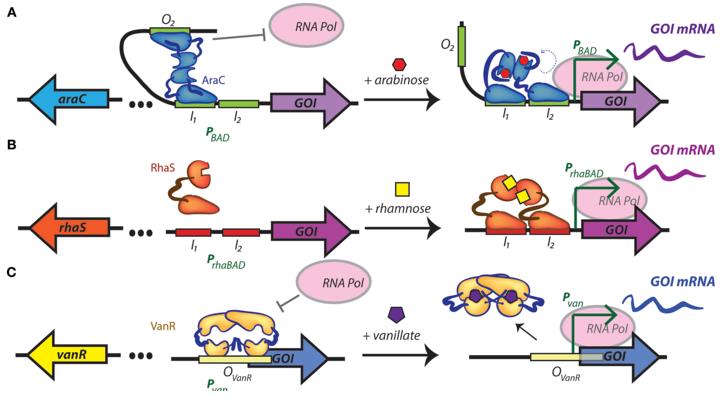Cyanobacteria Engineering Services
In the last decade, cyanobacteria have gained new interest as a basis for metabolic engineering and synthetic biology approaches. Efforts are underway to use transgenic cyanobacteria as a platform for biosynthesis production.
Lifeasible is able to provide engineering tools to promote the development of engineered strains of prokaryotic algae.
Introduction to the Cyanobacteria
Cyanobacteria can efficiently collect carbon dioxide as a carbon source to power their metabolic processes by absorbing sunlight, which is the most abundant form of renewable energy. However, unlocking their potential needs a radical re-engineering and application of cutting-edge synthetic biology techniques. In recent years, there has been an increase in the number of devices and strategies available to modify Cyanobacteria.
Engineering in Cyanobacteria
In recent years, a variety of strategies have been employed to improve the yield and efficiency of target chemicals in Cyanobacteria. These strategies include mutant selection using CRISPR/Cas systems, synthetic RNA elements to control transcription, modeling metabolic networks to understand pathway fluxes, enzyme engineering, improving growth rates, mitigating product toxicity, and microbial consortia.
However, the genetic toolbox developed in cyanobacteria is relatively limited compared to that working with popular heterotrophic species such as E. coli. A major effort has been made in recent years to expand the cyanobacterial toolbox and to facilitate cellular reprogramming for increased yield by modifying molecular technologies of other organisms, including promoters, riboswitches, RBS, reporters, modular vectors, and marker-less selection systems.
 Promoters Engineering
Promoters Engineering
Today, a number of the most advanced synthetic biology circuits and pathways are strongly rooted in an extensive and well-defined library of promoter "parts" that demonstrate predictable behavior in their use to drive the expression of a wide range of target genes. The three most commonly used exogenous promoters include the L-arabinose-inducible araBAD promoter (PBAD), the rhamnose-inducible rhaBAD promoter, and the orthogonal inducible promoter Pvan.
 Fig.1 Regulatory mechanisms of inducible promoters in cyanobacteria. (Santos-Merino, M., et al., 2019, Frontiers in bioengineering and biotechnology)
Fig.1 Regulatory mechanisms of inducible promoters in cyanobacteria. (Santos-Merino, M., et al., 2019, Frontiers in bioengineering and biotechnology)
 Ribosome Binding Sites Engineering
Ribosome Binding Sites Engineering
The rate of protein production from mRNA transcripts also relies on the strength of the RBS in recruiting ribosomes for translation. The location and sequence of a given RBS greatly affect translation efficiency, and it often remains difficult to predict the likely expression level of a construct at the design stage.
 Riboswitches Engineering
Riboswitches Engineering
Riboswitches, consisting of an aptamer sequence, are versatile tools for genetic engineering that can control gene expression by manipulating the secondary structure of mRNA transcripts. The use of cyanobacterial riboswitches is just starting to become more widespread relative to other microbial systems, and only a few riboswitch designs are commonly used for metabolic engineering applications.
 Reporter Proteins Engineering
Reporter Proteins Engineering
Reporters enable easy quantification of gene expression, visualization of subcellular localization, and protein interactions with other cellular components. Fluorescent reporter proteins do not require extra substrates to be detected in vivo and are available in sufficient color. However, the use of fluorophores in Cyanobacteria can be complicated by the autofluorescence of photosynthetic pigments.
Our Services
With many years of experience and knowledge in algae research, our company is able to provide professional algae engineering services to support the optimization of various conditions during the expression of exogenous genes in prokaryotic algae.
- Optimization of Promoters
- Optimization of Ribosome Binding Sites
- Optimization of Riboswitches
- Optimization of Reporter Proteins
There are a variety of algae strains that can be used as receptor algae for engineering operations.
- Synechococcus sp. PCC 7002
- Synechococcus elongatus PCC 7942
- Synechocystis sp. PCC 6803
- Synechococcus elongatus UTEX 2973
- Nostoc sp. PCC 7120
Why Choose Us

As a trustworthy CRO company, Lifeasible has provided premium prokaryotic algae engineering services for years. Please contact us for more information.
Reference
- Santos-Merino, M., Singh, A. K., & Ducat, D. C. (2019). New Applications of Synthetic Biology Tools for Cyanobacterial Metabolic Engineering. Frontiers in bioengineering and biotechnology, 7, 33.
Our services are for research use only and not for any clinical use.